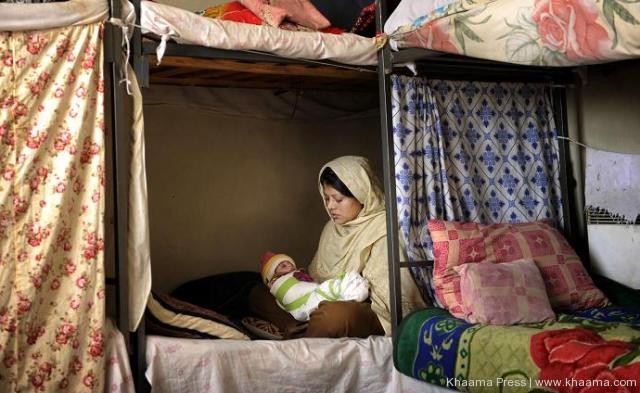By Mirwais Jalalzai

Zahra was exchanged for her brother's crime and married to a 65-year-old man. She ran away with the man she loved but was caught two years later. Now she is in jail with her baby, paying for the moral crime of running away with another man. (Photo: Khaama Press)
An Afghan woman named Zahra ran away with a young man after her father forced her to marry a 65-year-old villager. She and her lover were caught after almost two years and both were jailed for adultery.
Adultery is prohibited in Islam and Afghanistan is a country with 99% people.
As a journalist I covered the political issues of the country for several years but recently I visited several women and young girls like Zahra in prison and safe houses who faced abuse by their fathers or husbands for resisting arranged marriages.
There behind bars, as a humanbeing, I encountered Zahra taking care of her baby.
Unlike some of the other women, Zahra was willing to go in front of a camera and describe her ordeal. “I think she’s a very brave woman and she was the one who could talk and tell her story, but many others that I’ve met in the same situation, basically they didn’t do any crime according to the constitutional law of Afghanistan as I know as a former student of law and politics.
They want to live as any human being. They want to live with the partner that they want to, not the one that fathers force them to be with because of a piece of land, or money or because of exchange in the family.
Zahra’s brother had “stolen” the second younger wife of the 70-year-old reach man. To keep the brother from getting into trouble, Zahra’s father promised her to the older man to marry. Zahra was exchanged for her brother’s crime.
Like many women, when Zahra is eventually released from prison, her problems will not end.
Afghan women will continue to be dependent on sometimes hostile male relatives. “In Afghanistan as a woman, you can’t really live alone. There is no way to see that an Afghan woman can live on her own without family or without a main member of the family. That’s why the future for these women is really unclear,” said Sajya Qani afghan women activist.
“Most of them, they have to go back to their family, or otherwise many of them will be killed or they end up in a shelter forever, we had several examples of that kind.”
A few years back the Afghan government for the first time passed a law criminalizing practices such as handing over a woman to settle a dispute. In all, the Elimination of Violence against Women outlawed 22 such practices, including child marriage, forced marriage and rape. It also defined punishments for the perpetrators.
But a report issued by the UN recently showed implementation of the EVAW law has been slow four years later, Maybe because of International community or internal protests of human and women rights activist.
Although Afghan authorities registered more cases of violence against women (an increase of 28 percent from the previous year), the use of the EVAW law itself for indictments had increased by only 2 percent in 2013.
Instead, police and prosecutors tend to use mediation to settle the alleged cases of violence, and therefore the perpetrators don’t get the full punishment under the EVAW law.
“It’s an uphill battle in so many ways for women in Afghanistan,” said Farkhonda Zahra Nadiri an afghan women activist and member of Afghan parliament. “In general, few cases of crimes are prosecuted in Afghanistan, and women are always getting the least sort of support in the law in Afghanistan.”
The Afghan government also recently has tried to restrict the law. Parliament proposed prohibiting relatives from testifying against defendants, which critics said would make it difficult to prosecute domestic abuse of women, since it usually happens within the home in sight of other family members. At first, former President Hamid Karzai supported the measure but later backed down under international pressure. Women activists like Farkhonda and others are watching to see what the new government will do next.
“The new president have to do what he promise for the support of afghan women in electoral campaigns, the latest achievements of afghan women are faced with huge challenges”. Nasima Jalalzai an afghan lawyer and human rights activist said.
She said human rights organizations are concerned there will be even more attempts to roll back the advancements made since 2001 after U.S. and NATO troops leave at the end of this year and fewer eyes are on the country. “That’s all the more reason the international community needs to continue to be engaged so that women are not abandoned and those gains are not completely eroded.”
“It seems to me this issue of violence against women is something we ought to revisit,” she said in an online interview with Khaama press.
“When half of a country’s population is not allowed full equality, then what’s their future going to be? It’s going to be half as promising as it could be if everyone enjoys the same rights and opportunities,” said Nasima Jalalzai.
But Fawzia Kofi another member of parliament says laws and their improved implementation can only do so much. “The problem in Afghanistan is not the system it’s the tradition. I think it’s because tradition is still more strong than laws, and also because of the Taliban and extremists,” who still reign supreme in rural areas.



